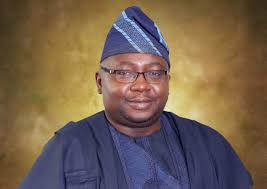799
Daniel Adaji
The Federal Government is ramping up efforts to transform Nigeria’s power sector with a renewed focus on grid expansion and renewable energy integration, leveraging strong financial and technical backing from the European Union (EU) and its member states.
Minister of Power, Chief Adebayo Adelabu, made this known during a meeting with the EU Ambassador to Nigeria, Gautier Mignot, in Abuja on Sunday.
He emphasized the importance of continued international collaboration, describing the power sector as the bedrock of Nigeria’s economic transformation.
“We are trying everything possible to ensure that we benefit from bilateral and multilateral relationships when it comes to gaining experience of the Western nations on the issue of power. The power sector is so critical to the optimal performance of every other sector,” Adelabu said.
Adelabu highlighted progress under President Bola Tinubu’s administration, noting reforms and investments that have boosted generation and transmission.
“We have achieved a valuable generation capacity of 6,003 megawatts ever in Nigeria. We have also achieved transmitted and distributed highest energy in the volume of 5,801.63, which has broken the previous record achieved in 2021,” he said.
The Minister credited the support of international partners such as Germany, France, and development agencies like GIZ, AFD, and the EU, particularly in renewables and grid infrastructure.
“EU as a body, the German Commission, the GIZ, the French AFD, the UK NIFE, all of them—they have been supportive in all areas, not just in renewables alone, even in grid activities too,” he said. “But like Oliver Twist, we keep asking for more,” he stated.
The Siemens-led Presidential Power Initiative (PPI), supported by Germany, is at the heart of Nigeria’s transmission grid overhaul. Adelabu disclosed that 10 power transformers and 10 mobile substations have been installed, improving grid stability and pushing daily grid supply to averages of 5,000–8,000 megawatts.
The EU Ambassador, Gautier Mignot, affirmed the bloc’s ongoing commitment to Nigeria’s energy transition, saying, “For us, the energy transition aspect is very important. We work with grants, work with loans through the EIB in particular… and the European Bank for Reconstruction and Development (EBRD) will also be a new source of financing.”
As Nigeria battles economic headwinds, Adelabu called for continued, friendly financial terms from development partners.
“We still require lots of financial support as the evolving economic landscape is not so favorable… After you have paid salaries, pensions, statutory deductions, and service debt—there will not be enough money for capital projects,” he said. “So I want the Western world to continue to fund us on friendly conditions.”
Adelabu also restated the government’s commitment to transforming the power sector at the second edition of the EnergyTimes Awards, where he was named Power Sector Personality of the Year.
“Electricity is the lifeblood of any economy—the catalyst for industrialization, job creation, and socio-economic development,” he said.
“We have prioritized the following under the Renewed Hope Agenda: Grid Strengthening and Expansion. Renewable Energy Integration. Policy and Investment Reforms. Rural Electrification,” he added.
He emphasized that the award “is not just a personal honour but a testament to the collective efforts of our government, partners, and industry players in tackling the critical challenges of power generation, transmission, and distribution in Nigeria.”
The Minister assured Nigerians that with continued collaboration and investment, the dream of stable, affordable, and sustainable electricity is within reach.



